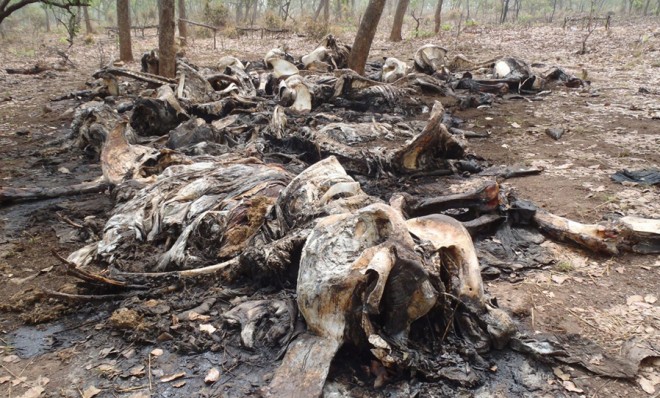Africa's devastating elephant-poaching problem
In Chad, 86 elephants become the latest casualties in a growing illegal ivory trade

A free daily email with the biggest news stories of the day – and the best features from TheWeek.com
You are now subscribed
Your newsletter sign-up was successful
At least 86 elephants, including 33 pregnant females, were killed over a single week in Chad, by "poachers traveling on horseback carrying AK-47s and hacksaws," reports The Guardian.
"Even if the conditions were right, which they are not, it would take more than 20 years for this population to recover," said Celine Sissler-Bienvenu from the International Fund for Animal Welfare. The most recent incident in Chad is just the latest in a growing, troubling epidemic.
How big of a problem is it?
The Week
Escape your echo chamber. Get the facts behind the news, plus analysis from multiple perspectives.

Sign up for The Week's Free Newsletters
From our morning news briefing to a weekly Good News Newsletter, get the best of The Week delivered directly to your inbox.
From our morning news briefing to a weekly Good News Newsletter, get the best of The Week delivered directly to your inbox.
Several elephants are killed every hour of every day, says a new report from the U.N. Poachers are the main culprits: "Illicit ivory trade activity and the weight of ivory behind this trade has more than doubled since 2007, and is over three times greater than it was in 1998." The report also warns that elephants might disappear completely from Central and West Africa if better protections aren't implemented.
Who is fueling the demand for ivory?
Mostly the "rapidly growing economies of Asia, particularly China and Thailand," says the U.N. In an op-ed in The New York Times, Samantha Strindberg and Fiona Maisels from the Wildlife Conservation Society lament the fact that ivory has become a luxury item:
In China and other countries in the Far East, there has been an astronomical rise in the demand for ivory trinkets that, no matter how exquisitely made, have no essential utility whatsoever. An elephant's tusks have become bling for consumers who have no idea or simply don't care that it was obtained by inflicting terror, horrendous pain and death on thinking, feeling, self-aware beings. [New York Times]
Al Jazeera reports that the price of ivory has surpassed $2,000 per kilogram on the Asian black market.
A free daily email with the biggest news stories of the day – and the best features from TheWeek.com
Why hasn't more been done to stop the poaching?
It's complicated. As Derek Mead at Motherboard puts it, "The trade has spiraled out of control, run by militant groups in Africa and organized crime in Asia, with little fear of serious crackdowns."
Political instability can make patrolling elephant habitats difficult. "Anti-poaching teams are often poorly equipped and the guards themselves are targeted," says Celeste Hicks at The Guardian. Between 2006 and 2009, 10 guards were killed in Chad's Zakouma National Park. The World Wildlife Federation's Bas Huijbregts tells Al Jazeera that the culprits in this case were likely the "same group of Sudanese poachers who killed over 300 elephants in northern Cameroon in February 2012."
In Asia, as is noted in the U.N. report, "highly-organized criminal networks operate with relative impunity to move large shipments of ivory off the continent and to markets in Asia." While regulations preventing the ivory trade do exist in Asia, countries such as China, Thailand and Vietnam need to "urgently and dramatically improve enforcement effort to crack down on illegal wildlife trade in their countries," says the WWF.
How can these countries better protect the elephants?
Earlier this month, officials from the Convention on Trade in Endangered Species called for more heavy-handed sanctions including banning countries that deal in ivory "from all wildlife trade, including hugely lucrative orchid and crocodile skin exports."
In countries like Chad, where poverty and corruption make stopping poachers difficult, the U.N. report recommends better training and technology paired with "appropriate mandates to allow park rangers to pursue poachers and conduct patrols outside park boundaries," as well as more international cooperation in apprehending and extraditing poachers. According to AFP, Cameroon, the Central African Republic, and Chad are taking a small step towards that goal by meeting in Cameroon's capital, Yaounde, this week to develop a more aggressive anti-poaching strategy.
Keith Wagstaff is a staff writer at TheWeek.com covering politics and current events. He has previously written for such publications as TIME, Details, VICE, and the Village Voice.
-
 How the FCC’s ‘equal time’ rule works
How the FCC’s ‘equal time’ rule worksIn the Spotlight The law is at the heart of the Colbert-CBS conflict
-
 What is the endgame in the DHS shutdown?
What is the endgame in the DHS shutdown?Today’s Big Question Democrats want to rein in ICE’s immigration crackdown
-
 ‘Poor time management isn’t just an inconvenience’
‘Poor time management isn’t just an inconvenience’Instant Opinion Opinion, comment and editorials of the day